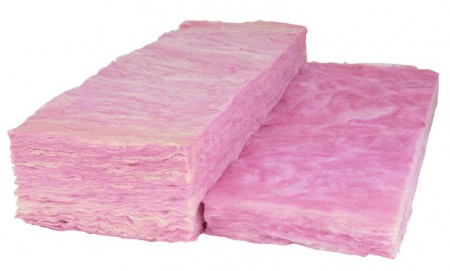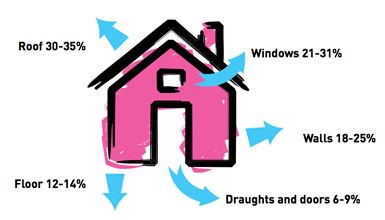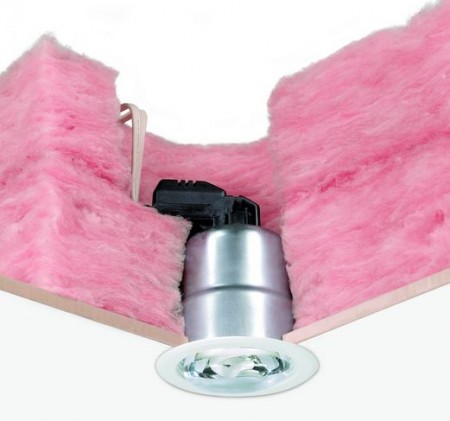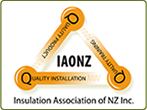
Pink Batts are a popular and trusted brand in NZ
Pink Batts
Without Pink Batts, an un-insulated home will lose 35% of its heat through the walls. This is a considerable amount when you look at heating costs. Figures from the Energy Efficient and Conservation Authority (EECA) show that 29% of energy bills for homes in New Zealand are spent on heating the home (with a further 30% on water heating), meaning that there are significant financial benefits to be had from insulating your property. Recent government campaigns, most notably, the “Warm Up New Zealand” campaign, have highlighted the importance of ensuring that your home is properly insulated, and has made a major commitment to improving the energy efficiency of both individual homes and the nation as a whole.
The Energy Efficiency & Conservation Authority (EECA) estimate that most households can reduce their energy bills by 20%, and much of that saving will come through cavity wall and loft insulation. It is estimated that installing insulation can reduce heat loss by over 50%, a direct cut of 15% of your annual energy bills (an average of $2,000) in one easy step. Further savings can be made through more considered energy use, for example, using heating during daylight hours. This may sound counter intuitive, but will good insulation, that heat will be retained through the night. The Energy Saving Trust place an exact figure on the amount you can save through cavity wall insulation, $210 per year, meaning that as a return on investment, insulation instillation is as high as it comes, with most homes able to recoup the cost of insulation between 18 months and four years from instillation.
Reduced energy bills are not the only benefit of installing insulation. By reducing the temperature difference between internal and external walls, cavity insulation reduces the amount of condensation created within the home, a major cause of damp, which leads to both structural problems and some health issues. Health issues? It has been proved, most notably in studies by the Wellington School of Medicine and Health, that poorly insulated homes can cause some serious health issues. Cold, damp air, common in uninsulated properties, is breathed in, exacerbating or even causing asthma, bronchitis, and in serious cases, rheumatic fever. It may seem unlikely, but New Zealand’s high asthma levels and surprisingly high winter death rate has been directly linked to poor insulation in many homes.
Do homes in New Zealand need insulating?

Heat is lost many ways without Pink Batts insulation
Homes built after 2008 were subject to strict insulation regulations and are most likely to have sufficient insulation. Homes build between 1987 & 2008 will have some insulation, having been subject to insulation specific building regulations, but there is no guarantee that the insulation installed will meet current specifications, nor that the insulation used is providing the best insulation available. It could be hugely beneficial to get homes built during this period examined by an insulation expert. Homes built before the building standards change 1987 will almost certainly require insulation, as very few were built with adequate, if any insulation.
Simply put, if your home is expensive to heat, or you require a de-humidifier to tackle issues of damp, the root cause is most likely poor insulation.
Which Insulation to use? Pink Batts?
There are many insulation types available in New Zealand, the most popular including GreenStuf, Bradford Gold and Pink Batts. Pink Batts insulation is the third generation of the established brand. Designed specifically for conditions in New Zealand, Pink Batts has passed the test of time for New Zealand homes, with expert fitters able to advise from over 50 years of experience working with the material. Awarded the highest M1 Air Quality Certification (an independent Swedish air quality certificate), peace of mind is guaranteed. The specific climatic conditions of New Zealand require a custom made insulation material to ensure that living conditions are optimal year-round, and the differences in conditions do not cause material degradation. 50 years of constant development and innovation specifically in local climatic conditions has resulted in an insulation material that is guaranteed to provide the perfect insulation for New Zealand homes.
The structure of most homes in New Zealand, with timber frames, also means that insulation needs to have specific structural properties, which imported insulation will almost certainly not have. There is little cavity space in timber framed homes, so Pink Batts insulation has been adapted to stand under its own weight, throughout the product’s 50 year lifetime, preventing loss of performance or sagging, and therefore the need for frequent adjustment or replacement. This means that there are no false economies as repair work eats away at savings.
Recognised by the iconic pink colour, Pink Batts is a high quality glass wool, the best material for maintaining heat in winter and keeping the property cool in summer. Glass wool has been independently proved to be the best material for heat insulation, providing much better R-ratings per thickness than other common insulation materials, meaning that thin cavities can still provide a huge increase in insulation, and reduction in heating costs.
Other Benefits of Installing Pink Batts in your home
The most measurable benefit of installing Pink Batts insulation is financial. The reduction in heating bills has already been mentioned, but to quantify, BRANZ research has shown that a previously un-insulated home in New Zealand could completely repay the instillation costs in just four years through reduced heating bills. On a product with a 50 year lifespan, the future savings are hard to ignore. This is on current energy prices. Since 2001, energy prices have increased 87%, and the trend is unlikely to reverse significantly in future. Although there is no guarantee on future energy pricing trends, it is highly likely that installing Pink Batts insulation will provide a return on investment unheard of in the financial sector.
The World Health Organisation recommends that homes are kept at a fairly constant 18-24⁰C throughout the year to prevent respiratory problems, and by insulating using Pink Batts, home owners are able to vastly reduce the temperature fluctuations throughout the year, retaining heat in winter and preventing heating during the summer months. This, coupled with the reduction in the amount of condensation within the home (insulation reduces temperature differentials within the home which cause water vapour to condense from air), Pink Batts insulation reduces the possibility for mould, mildew and even dust mites; the major causes of respiratory problems and allergies in New Zealand. On top of these obvious benefits, Pink Batts is also an excellent noise dampener, reducing noise disturbance both in and out of the home.
Lifetime of Pink Batts Insulation

Pink Batts insulation can be cut to fit around light fittings
Pink Batts insulation will last up to 50 years before it needs any attention. Fire and rot resistant, Pink Batts will not degrade like many insulation materials, and is not a good food source for vermin, the scourge of many cavity insulations. The material is resistant to all the common causes of insulation degradation, and the manufacturer offers a 50 year guarantee, (on top of the installer guarantee), providing complete peace of mind that the return on investment expected will not be damaged due to repeat visits, adjustments or replacements.
Price of Pink Batts insulation in New Zealand
Pink Batts is made from 80% recycled glass, manufactured solely in New Zealand. This means that it is both readily available from installers in NZ and a very cost effective insulation material. Whilst it is possible to install Pink Batts yourself, it is strongly recommended that Pink Batts instillation is done by a professional. This is to ensure that the insulation is installed to the highest quality standards. Failure to install accurately will vastly reduce the effects of insulating your home, as small gaps can cause large escape points for heat. Studies have shown that even relatively small gaps in insulation coverage can have significantly large impacts on the heat loss (and cost of heating) in a home. A 5% gap can reduce the effectiveness of home insulation by some 50%, doubling the amount of time it could take to see a profit after insulating your home. The negative effects on health and damp are less clear statistically.
Such is the confidence in the quality of Pink Batts insulation, the manufacturer offers a Pink Batts lifetime Guarantee, which is included on all Pink Batts insulation.
With over 50 years of experience insulating homes in New Zealand, an industry expert will very quickly be able to analyse the potential benefit, as well as the most suitable insulation material with which to insulate your home. There is no replacement for experience.


